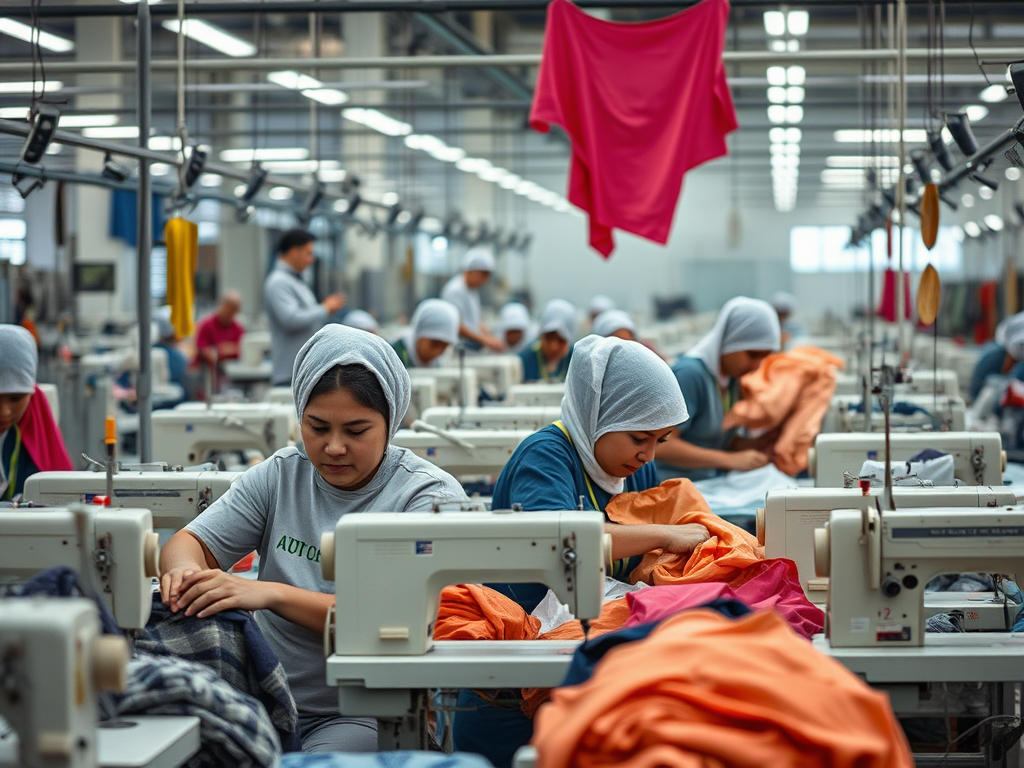Urban Outfitters is a retailer that has become synonymous with contemporary fashion and a unique lifestyle aesthetic. However, beneath its stylish surface lies a complex reality regarding its production practices. While the company markets itself as an edgy, youthful brand, various investigations have raised serious concerns about the working conditions in the factories that produce its merchandise. The dilemma touches on significant ethical issues regarding labor rights and corporate responsibility in the fast fashion industry. As consumer awareness grows, shoppers increasingly seek transparency about where and how their clothing is made. Understanding the complexities of Urban Outfitters’ production practices is vital not just for ethical consumers, but for anyone concerned about social justice in today’s global economy.
Understanding Sweatshops

Sweatshops are not merely a relic of the past; they continue to exist in various forms around the world, often in countries with lax labor laws and inadequate regulatory oversight. These factories are characterized by incredibly poor working conditions, including low wages, lack of safety measures, and long working hours. For many workers, especially in developing nations, these sweatshops represent a distressing trap—providing them with jobs that, while better than total unemployment, come with severe drawbacks. The term “sweatshop” conjures images of exploitation and human rights violations, drawing attention to the ethical implications of consumer choices. Brands that use sweatshops often do so to cut costs, but this raises a significant moral question: At what cost does fast fashion come? By understanding the true nature of sweatshops, consumers can make informed decisions.
Urban Outfitters’ Production Practices

Urban Outfitters sources its products from diverse manufacturers worldwide, which complicates its supply chain structure. In recent years, the public has demanded greater scrutiny of these brands regarding their sourcing practices. Urban Outfitters has faced criticism for not always disclosing the locations of its manufacturing facilities. This lack of transparency raises ethical concerns, as consumers cannot truly understand the conditions under which their clothes are made if the information is shrouded in secrecy. Furthermore, the company’s production practices often reflect broader issues within the fashion industry, such as the prioritization of profit over ethical labor standards. A clear understanding of these practices not only illuminates the state of Urban Outfitters’ supply chain but also highlights the pressing need for accountability in corporate practices.
| Key Concerns | Implications for Consumers | Retailer Responses |
|---|---|---|
| Poor working conditions | Ethical dilemmas regarding purchases | Commitments to improvement |
| Low wages | Awareness of economic exploitation | Transparency initiatives |
| Long hours | Consumer responsibility | Collaborations with watchdogs |
Labor Conditions and Worker Treatment
When examining Urban Outfitters’ labor conditions, it is essential to investigate how the company’s practices measure up against standard labor rights. Reports have indicated that conditions in some factories can be subpar, with workers facing excessive hours without appropriate compensation. For example, many workers do not enjoy the legal minimum wage, leading to financial insecurity. This situation is exacerbated when basic rights such as bathroom breaks or time off are not honored. Unfortunately, these struggles are not uncommon in the fast fashion industry, where speed and low cost take precedence. Workers are often trapped in a cycle of debt and desperation, exacerbated by the companies they work for. Thus, the plight of these laborers prompts a broader conversation about ethical consumerism.
Transparency in Supply Chain
Transparency is a cornerstone of ethical business practice. Although Urban Outfitters has made some strides in providing more information about its production practices, significant gaps still exist. Consumers are increasingly seeking brands that disclose their supply chain information to make informed decisions. By revealing details about factories, labor practices, and materials used, Urban Outfitters can build trust with its customer base. According to various reports, many leading brands have embraced greater transparency and accountability. Even though Urban Outfitters has taken steps in this direction, there’s still much room for improvement. As the industry evolves, consumer pressure will likely push Urban Outfitters and similar brands toward more ethical practices.
Investigations and Reports on Sweatshop Allegations
Over the years, various investigations have shed light on the alleged labor abuses associated with Urban Outfitters. Reports from watchdog organizations have raised serious concerns, indicating that the company has used factories with deplorable working conditions. Some key findings from these investigations include:
- Inadequate safety measures in factories.
- Testimonies from workers regarding excessive overtime without fair pay.
- Evidence suggesting workers were unable to freely communicate grievances.
Such allegations have led to an outcry from activists, consumers, and various labor rights organizations. Specific case studies highlight individual workers’ experiences, adding a human element to the issue that cannot be ignored. Urban Outfitters has publicly addressed some of these concerns, but many argue that these efforts do not go far enough. The lingering question remains: Are the policies in place sufficient to ensure fair labor practices across the company’s entire supply chain? Only time will tell how effectively these changes will be implemented.
Corporate Responsibility and Ethical Fashion
Urban Outfitters has publicly claimed to commit to corporate social responsibility by exploring ethical sourcing practices. However, the company’s track record raises questions about the effectiveness of these commitments. Several initiatives designed to improve working conditions have been proposed, but the real test lies in consistent implementation across the board. To gauge Urban Outfitters’ sincerity, consumers should examine the following initiatives:
- Partnerships with social accountability organizations.
- Adoption of ethical codes of conduct for suppliers.
- Programs aimed at worker empowerment and education.
While these efforts are promising, the outcomes will ultimately determine whether Urban Outfitters can transform its production practices. Active engagement from consumers advocating for ethical labor practices can serve as a driving force for change. Establishing a more sustainable and ethical fashion industry will require not only consumer support but also unwavering commitment from brands like Urban Outfitters to improve conditions.
Conclusion
The conversation around Urban Outfitters and sweatshops highlights the often-unseen complexities of the fashion industry. As consumers become more conscientious about the origins of their clothing, the pressure mounts for brands to operate with integrity. Urban Outfitters finds itself at a crossroads—facing scrutiny while attempting to balance profit and ethics. By understanding the implications of their production practices, consumers can make informed decisions that align with their values. The quest for ethical consumerism is not an easy one, but it is crucial for fostering a fairer, more just global economy.
Frequently Asked Questions
- What defines a sweatshop?
A sweatshop is defined as a workplace that does not pay fair wages, has unsafe working conditions, and demands excessive hours from its employees. - Is Urban Outfitters known to use sweatshops?
There have been multiple allegations and investigations suggesting that Urban Outfitters has used facilities that could be classified as sweatshops. - What is Urban Outfitters doing to improve working conditions?
Urban Outfitters has launched initiatives to increase transparency and improve labor conditions across their supply chain. - How can consumers ensure they are not supporting sweatshops?
Consumers can research brands, look for certifications, and choose to buy from companies that prioritize ethical practices. - Are there alternative brands that focus on ethical production?
Yes, there are several brands committed to ethical production and transparency in their supply chains.



